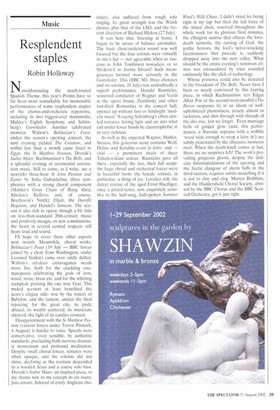Resplendent staples
Robin Holloway
Notwithstanding the much-touted Spanish Theme, this year's Proms have so far been most remarkable for memorable performances of some resplendent staples of the chorus-and-orchestra repertoire, including its two biggest-ever mammoths. Mahler's Eighth Symphony and Schonberg's Gun-elieder. Another celebrated monster, Walton's Belshazzar's Feast, ended the season's opening concert, the next evening yielded The Creation, and within less than a month came Israel in Egypt, the St Matthew Passion, Dvorak's Sta bet Mater. Rachmaninov's The Bells, and a splendid evening of ceremonial coronation music. Still to come, as I write, are a new(ish) three-hour St John Passion and Easter by Sofia Gubaidulina, three symphonies with a strong choral component (Mahler's Great Chain of Being third, Sibelius's KuHerr° and, of course, Beethoven's Ninth): Elijah, the Durufle Requiem, and Handel's Samson. The season is also rich in opera: though a bit thin on less-than-standard 20th-century music and positively meagre on new commissions, the heart in several central respects still beats loud and sound.
I'll hope to cover these other aspects next month. Meanwhile, choral works. Belshazzar's Feast (19 July — BBC forces joined by a choir from Washington, under Leonard Slatkin) came over oddly dulled. Walton's art-deco extravaganza needs more fire, both for the crackling onomatopoeia celebrating the gods of iron, wood, stone, brass etc. and for the whirling stampede praising the one true God. This muted account at least benefited the score's elegiac side: woe by the waters of Babylon, and the lament, amidst the final rejoicing, for the great city, its pride abased, its wealth scattered, its musicians silenced, the light of its candles sconced.
Disappointment with the St Matthew Passion (various forces under Trevor Pinriock, 4 August) is harder to voice. Speeds were conservative, even sensible, by authentic standards, precluding both nervous dramatic momentum and profound meditation. Despite small choral forces, textures were often opaque, and the soloists did not shine, declining as the tessitura descended to a wooden Jesus and a coarse solo bass. Dvorak's Stabet Mater, an inspired piece, to my shame new to me (except its eia mater, fans amoris, beloved of every Anglican cho
rister), also suffered from rough solo singing. Its great strength was the Welsh chorus, plus that of the LSO, and the fervent direction of Richard Hickox (27 July).
It was here that, listening at home, I began to he aware of balance anomalies. The basic choir/orchestra sound was well focused but the four soloists were virtually
in one's lap not agreeable when so raucous as John Tomlinson nowadays, or so Silvikrin'd as Jorma Silvasti! Such incongruences loomed more seriously in the Gun-elieder. This (BBC SO, three choruses and six soloists, 28 July) was undoubtedly a superb performance. Donald Runnicles, seasoned conductor of Wagner and Verdi in the opera house, Zemlinsky and other last-ditch Romantics in the concert hall, opened up without fuss or hindsight 'modern music' X-raying Schonberg's often clotted textures, letting light and air into what can under lesser hands be claustrophobic in its very richness.
As well as the expected Wagner, Mahler, Strauss, this generous score contains Wolf, Delius and Scriabin avant la lettre, and — vital — a prominent strain of sheer Tchaikovskian ardour. Runnicles gave all these, especially the last, their full scope: the huge choral and orchestral forces were in beautiful form; the female soloists, in particular, a thing of joy. Lovelier still, the dulcet ecstasy of the aged Ernst Haefliger, once a prized tenor, now exquisitely sensitive in the half-sung, half-spoken Summer
Wind's Wild Chase. I didn't mind his being right in my lap: but then the full force of the mixed choir, reserved throughout the whole work for its glorious final minutes, the effulgent sunrise that effaces the lovedeath turmoils, the cursing of God, the gothic horrors, the fool's nerve-wracking facetiousness that precede it, suddenly dropped away into the next valley. What should be the entire evening's sonorous climax was emasculated by what sounded ominously like the click of technology.
Whose presence could also be detected in the broadcast of The Bells. Never have I been so nearly convinced by this louring piece, in which Rachmaninov sets Edgar Allan Poe at his second-most-morbid (The Raven surpasses it) in an idiom of wellupholstered plumminess, treacly almost to tackiness, and shot through with threads of the dies irae, lest we forget. Even marriage bells of golden glow (and, this performance, a Slavonic soprano with a wobble 'weed wide enough to wrap a fairy in') are subtly penetrated by the obsessive memento mori. When the death-knell comes at last, there are no surprises left! The work's prevailing gorgeous gloom, despite the delicate tintinnabulations of the opening and the hectic clangour of alarm bells in the third section, requires subtle modelling if it is not to cloy and clog. Martyn Brabbins, and the Huddersfield Choral Society, abetted by the BBC Chorus and the BBC Scottish Orchestra, got it just right.


























































 Previous page
Previous page